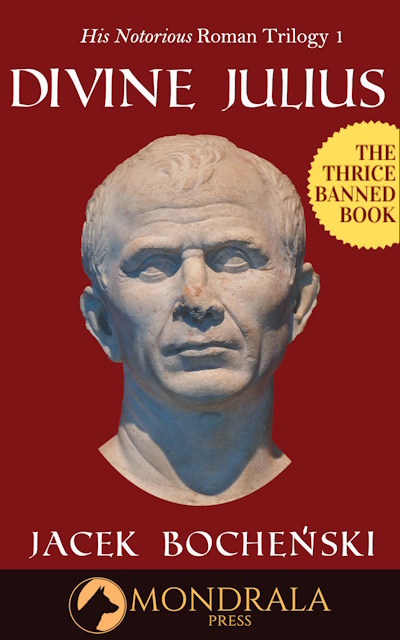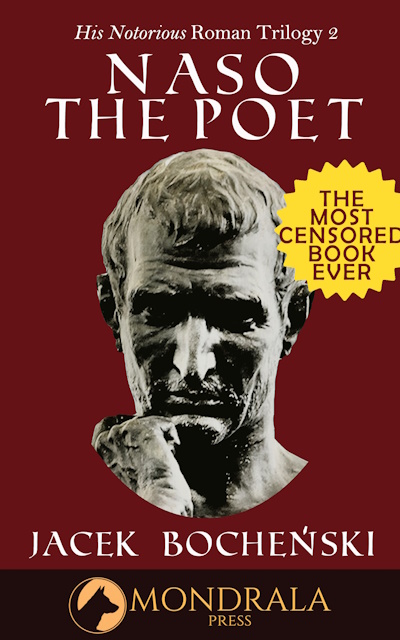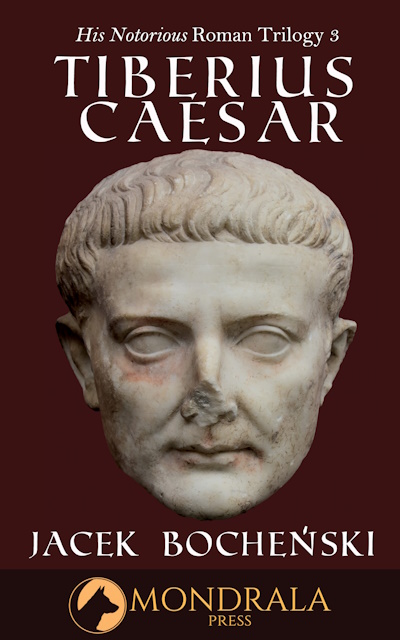Bocheński’s Roman Trilogy
The most important literary work
to come out of Eastern Europe
since World War Two
In 1961, a disillusioned young communist wrote a novel about ancient Rome. His idea was to get away from the politics of the here and now, and write something lighthearted and entertaining on a safe, abstract, remote topic. Contrary to his expectations, his readers discovered in it a mirror of their times, a critique of their own regime. The novel caused a furor, was first withdrawn, then banned.
This banishment launched two unexpected and unlooked-for careers: the first – of Bocheński’s books as underground best-sellers, copied in underground printshops and passed furtively from hand to hand; and the second – of Bocheński himself as one of the leaders of the Polish Solidarity movement. Interned during the martial law (1981-83), Bocheński went on to become an advisor to President Wałęsa and is today a decorated national hero.

“He had worked out by then the great conception of his life, which, to put in simplest terms, was this: the dictator of Rome shall be a liberal; all civil wars will be won by a pacifist; and: the Republic will be destroyed most effectively by preserving its institutions. Only two things were needed to attain all these goals: an army and money. Besides, it is important to keep in mind that dictators are not installed by soldiers or bankers; they are installed by enthusiastic crowds.”

eBook: $9.99
paperback: $15.99
hardcover: $23.99
“Would you like to become a god? It has been done before, you know. There are techniques.”So starts the first volume of Bocheński’s Roman Trilogy, the first – totally innocent and unpremeditated – step on his road to civil disobedience. Written in the terse, abbreviated style imitating Caesar’s Memoir of the Gallic War, Divine Julius is a picaresque tale about a charismatic cynic overthrowing a Republic. Though it pretends to be a tongue-in-cheek how-to book for aspiring dictators, it is really the story of the compromises made by the Roman elites who made the overthrow possible – in exchange for offices, debt-forgiveness, economic opportunities, friendship, out of personal loyalty, for the peace of mind.
While its political message has long been celebrated as the book’s main claim to glory, its structure and writing style represent a great literary accomplishment. Pick up this is absolutely world class writing for the modern thinking man.

eBook: $9.99
paperback: $15.99
hardcover: $23.99
Ovid, Rome’s greatest poet, was sent into exile for life and his works were consigned to erasure. But they weren’t forgotten. Readers touched by their beauty preserved their precious volumes and copied them by hand so that the literature which had offended the government of Rome may yet live on forever. And it has.
This book is a brilliantly told tale of the Roman poet’s rise and fall by an author whose works have experienced a similar trajectory: from government banishment to best-seller status on the strength of underground distribution. A document of a critical period in Eastern Europe’s history the work is also a great work of literature. Structured almost flippantly as an imaginary variety show, it features beautiful retellings of Ovid’s poems, stress poetry composed in his style, and a tongue-in-cheek imaginary post-modern police investigation.

eBook: $9.99
paperback: $17.99
hardcover: $31.99
Thirty five years after Divine Julius (how to overthrow a republic in four easy steps) came the sobering volume three of the Trilogy: the horrifying tale of the second emperor of Rome: the man who normalized political terror. A moral, intellectual, emotional zero whose only skill in life was to seize power and to hang onto it. At any cost.
But the book is also a brilliant work of literature, with deeply moving passages of beautiful prose, many of which would stand as independent essays. If you enjoy literary prose, the style of this book will astonish and delight you.
And if, in your pleasant and secure life in a Western, constitutional democracy you have grown complacent and bored with all the freedoms you take for granted–you should read this as a warning. Because you should be afraid. You should be very afraid. If you lose your republic, this is what you will have.

Jacek Bocheński (b. 1926) expelled from the communist party in 1966, became one of the founders and editor of the underground literary journal “Zapis.” Interned by the communist government during Martial law. 1988-1990 member of the (advisory) Civic Committee to Lech Wałęsa. In 1989, he became one of the founders of the Polish Writers’ Association. In the years 1995-1997, he was vice-president, and then in the years 1997–1999, president of the Polish PEN Club.Jacek Bocheński (b. 1926) expelled from the communist party in 1966, became one of the founders and editor of the underground literary journal “Zapis.” Interned by the communist government during Martial law. 1988-1990 member of the (advisory) Civic Committee to Lech Wałęsa. In 1989, he became one of the founders of the Polish Writers’ Association. In the years 1995-1997, he was vice-president, and then in the years 1997–1999, president of the Polish PEN Club.
SPECIAL OFFER!

Get the entire trilogy in beautiful hard covers 40% OFF and FREE SHIPPING!*
*(allow 2 weeks for delivery)





